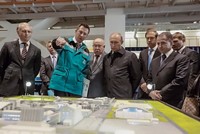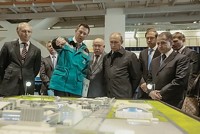Advertisement
Grab your lab coat. Let's get started
Welcome!
Welcome!
Create an account below to get 6 C&EN articles per month, receive newsletters and more - all free.
It seems this is your first time logging in online. Please enter the following information to continue.
As an ACS member you automatically get access to this site. All we need is few more details to create your reading experience.
Not you? Sign in with a different account.
Not you? Sign in with a different account.
ERROR 1
ERROR 1
ERROR 2
ERROR 2
ERROR 2
ERROR 2
ERROR 2
Password and Confirm password must match.
If you have an ACS member number, please enter it here so we can link this account to your membership. (optional)
ERROR 2
ACS values your privacy. By submitting your information, you are gaining access to C&EN and subscribing to our weekly newsletter. We use the information you provide to make your reading experience better, and we will never sell your data to third party members.
Economy
Chemical industry under pressure to cut ties with Russia
After the invasion of Ukraine, some of the world’s largest chemical companies are shunning Russian business
by Alexander H. Tullo
March 17, 2022
| A version of this story appeared in
Volume 100, Issue 10

Russia’s invasion of Ukraine has made Russia a pariah for multinational companies, including chemical makers, who are under mounting pressure to disengage from the country.
In an address on March 15, Ukrainian president Volodymyr Zelenskyy called out the world’s largest chemical company, BASF, and the drug companies Bayer and Sanofi as among the “large corporations that still sponsor Russia’s military machine and have not left the Russian market, although they should have done so immediately.”
BASF has 12 chemical production sites in Russia, where it employs about 700 people. It is also a majority partner in Wintershall Dea, an oil and gas company that has extensive operations in the country.
BASF says it hasn’t conducted new business in Russia and Belarus since March 3. “An exception,” it says in an emailed statement, “are products supporting food production, as the war holds the risk to trigger a global food crisis.” BASF says it is also following applicable laws and regulations. “We take responsibility for the safety of our chemical production sites in Russia and continue with their maintenance.”
Dow, the largest US chemical maker, told C&EN in an email that it has suspended all purchases of feedstocks and energy from Russia. Dow says it has also “significantly reduced its operations and product offerings in the country” and halted investment. It adds, however, that it is still supplying “limited essential goods in Russia, including food packaging, hygiene, cleaning and sanitation products and household goods.”
Dow operates a polymer dispersion plant and owns a stake in a polyurethane systems joint venture in Russia. The company says it is providing evacuation support for employees and their families in Ukraine and is also looking to do so for its Russian workers.
Solvay is suspending operations and new investments in Russia. It is also suspending the dividend payments it receives from RusVinyl, its polyvinyl chloride joint venture with the Russian chemical maker Sibur. RusVinyl is among the largest chemical investments in Russia by a foreign firm. It opened in 2014 in Kstovo at a cost of $1.6 billion.
Clariant is suspending business in Russia. The Swiss company runs a sales office and laboratory in Moscow and derives 2% of its sales, about $94 million, from the country. It also operates a catalyst plant in Ukraine.
“Our thoughts are with our 146 employees and their families in Ukraine and we are doing everything in our power to support them,” Clariant CEO Conrad Keijzer says in a statement.
Petrochemical maker LyondellBasell Industries says it will not enter new transactions or relationships with Russian state-owned entities. It also intends to discontinue business relationships with such entities to the “extent legally possible.” The company has two offices in Russia.
“I am watching the tragic and unprovoked attacks unfold in Ukraine and condemn the acts of aggression and violence against the Ukrainian people,” LyondellBasell interim CEO Kenneth Lane says in a statement.
DuPont says it is suspending business operations in Russia and Belarus. It runs an innovation center in Moscow.
The war has also stopped a potential deal under which the Austrian petrochemical maker Borealis would have sold its nitrogen fertilizer business to EuroChem for $520 million.
EuroChem is based in Switzerland, but most of its assets are in Russia. Moreover, it was founded by Andrey Melnichenko, who until recently controlled 90% of the company. He is on the European Union’s list of sanctioned Russian people.
On the same day that Borealis abandoned the deal, EuroChem announced that Melnichenko had stepped down as a director and beneficiary of the company. A few days later the firm said its CEO, Vladimir Rashevskiy, who is also on the sanctions list, had resigned.




Join the conversation
Contact the reporter
Submit a Letter to the Editor for publication
Engage with us on Twitter